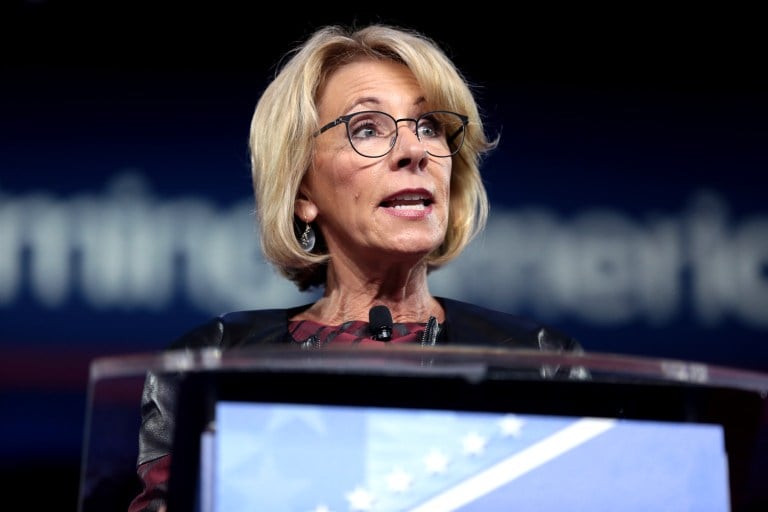Students in Graduate School of Business (GSB) class GSBGEN 383: “Practical Policy and Politics” had a particularly high-profile guest speaker Thursday morning: Secretary of Education Betsy DeVos, who visited Stanford before heading to a school in Milpitas.
The MBA/MSx course is taught by GSB lecturer Keith Hennessey ’90, who was assistant to the U.S. President for Economic Policy and director of the U.S. National Economic Council under President George W. Bush. According to Hennessey, students only learned that DeVos was visiting when she walked into the room.
“They were quite surprised when she walked in the room, and there was a surge of excitement and adrenaline as they suddenly realized they’d be able to ask and challenge her directly on these topics,” wrote Hennessey in an email to The Daily. “They did both, quite effectively.”
DeVos spent the full one hour and 45 minutes fielding questions from the class, with most of the questions coming from students. Hennessey declined to elaborate on the content of the session as well as any past acquaintance he might have had with DeVos during his career as a policymaker.
“I’m sorry I can’t say more about the substance because we agreed it would be off the record,” said Hennessey.
After delivering the lecture, DeVos paid a visit to the d.school, where she spoke to several students. Jacqueline Wibowo ’18 M.S. ’18 was working on a group project for a management science and engineering class when DeVos approached them in their workspace.
“She just ended up coming to our stations asking what we were doing,” said Wibowo.
Wibowo said her group was working to brainstorm a possible research question based on a single-word prompt, “money,” and was curious about DeVos’ thoughts given her background.
“She said she was thinking about her grandkids [and] how she would explain the concept of money to a two-year-old for the first time,” said Wibowo.
Wibowo added that some of her project partners had reservations about DeVos based on her decisions as Secretary of Education, but that the group agreed that she was “articulate” and her contribution “very insightful” despite their misgivings.
DeVos sparked controversy last month when she revoked key Obama-era Title IX regulations, rescinding the 2011 “Dear Colleague” letter that enumerated school’s responsibilities for handling sexual assault cases and, among other things, mandated that schools use a lower standard of evidence to find guilt in such cases. DeVos has criticized schools’ Title IX programs for overstepping their authority and denying accused students due process — a focus that quickly came under fire from advocates for sexual assault victims, including many at Stanford.
Interim guidelines issued by DeVos now allow colleges and universities to decide what standard of evidence they want to employ.
“This interim guidance will help schools as they work to combat sexual misconduct and will treat all students fairly,” DeVos said. “Schools must continue to confront these horrific crimes and behaviors head-on. There will be no more sweeping them under the rug. But the process also must be fair and impartial, giving everyone more confidence in its outcomes.”
Prior to DeVos’ confirmation as Secretary of Education, campus activist groups mobilized students to oppose her appointment by calling their local and state representatives. She was eventually confirmed by the margin of just one vote, with Vice President Mike Pence casting the tiebreaker.
According to GSB spokesperson Heather Hansen, the communications office did not receive advance notice of DeVos’ visit to Stanford.
Contact Hannah Knowles at hknowles ‘at’ stanford.edu and Fangzhou Liu at fzliu96 ‘at’ stanford.edu.
